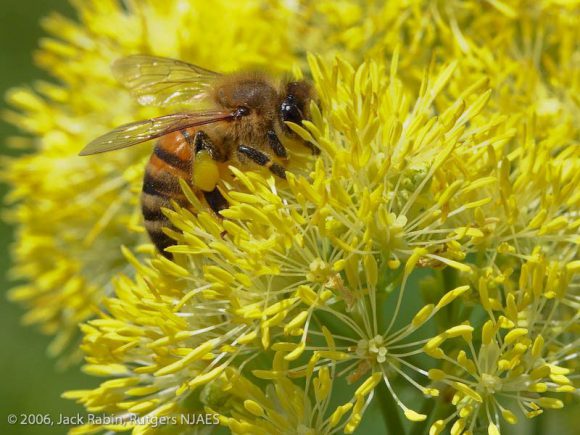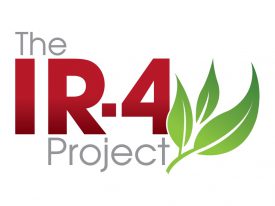
Honeybee on flower carrying full load of nectar and pollen on hind legs.
This summer, the USDA announced its 2016 Specialty Crop Research and Extension Investments (SCRI) projects, funded through USDA’S National Institute of Food and Agriculture (NIFA). Two of the 19 projects announced were awarded to IR-4 Project’s Ornamental Horticulture Program based at Rutgers.
The first project, “Protecting Pollinators with Economically Feasible and Environmentally Sound Ornamental Horticulture,” is supported by a five-year grant funded for the first two years at almost $2.9 million. This funding will support 21 scientists and extension experts at 12 different institutions, including Rutgers; Connecticut Agriculture Experiment Station; Cornell Cooperative Extension of Suffolk County; Clemson University; Michigan State University; Penn State University; Plant Management Network; University of California – Agriculture and Natural Resources; University of California – Davis; University of Florida; University of Kentucky; and University of Maine.
 Cristi Palmer, IR-4’s ornamental horticulture manager, worked with this multi-institution team to develop the project’s objectives, which include identifying pollinator attractiveness of top selling crops; filling specific regulatory data gaps for pollinator risk assessment of systemic insecticide residues within ornamental horticulture crops; comparing current pest management practices with alternative strategies; providing guidance to growers and landscape managers with updated Best Management Practices; and developing outreach tools for multiple stakeholder audiences.
Cristi Palmer, IR-4’s ornamental horticulture manager, worked with this multi-institution team to develop the project’s objectives, which include identifying pollinator attractiveness of top selling crops; filling specific regulatory data gaps for pollinator risk assessment of systemic insecticide residues within ornamental horticulture crops; comparing current pest management practices with alternative strategies; providing guidance to growers and landscape managers with updated Best Management Practices; and developing outreach tools for multiple stakeholder audiences.
Ultimately, this coordinated project will aid in reaching the federal government’s goal of restoring or enhancing seven million acres of pollinator habitat by providing growers and landscape managers the knowledge to address pests while producing high quality plants for pollinator forage.
IR-4 was also awarded a grant of $50,000 for the project, “Identifying Knowledge Gaps and Novel Management Strategies for Downy Mildews Impacting Environmental Horticulture Crops.” Environmental horticulture crops (EHCs) are one of the highest value-per-acre specialty crop industries in U.S. agriculture, providing thousands of jobs and generating more than $20 billion to annual GDP in the U.S. EHCs are plants placed into residential and commercial landscapes, interiorscapes, arboreta, parks, sports fields and recreational areas and are increasingly threatened by outbreaks of downy mildew (DM) diseases. The production of several high value EHCs is currently at risk due to this disease. This project will gather researchers, extension specialists and growers to discuss gaps for DMs where research is needed to develop better control solutions to increase long-term profitability for growers, reduce the incidence and severity of DMs, and ultimately lead to reduced impact on the environment by reducing pesticide use.
Jerry Baron, executive director of IR-4 Project, said, “The IR-4 Project is grateful for these opportunities to serve specialty crop growers. We are also grateful for the network of collaborators who have joined together to find solutions to meet the needs for new knowledge and methodologies to manage pests and diseases to help the growers of these high valued specialty crops.”
To date, NIFA has awarded almost $400 million through the SCRI program. NIFA invests in and advances innovative and transformative initiatives to solve societal challenges and ensure the long-term viability of agriculture. NIFA’s integrated research, education, and extension programs, supporting the best and brightest scientists and extension personnel, have resulted in user-inspired, groundbreaking discoveries that are combating childhood obesity, improving and sustaining rural economic growth, addressing water availability issues, increasing food production, finding new sources of energy, mitigating climate variability and ensuring food safety.

